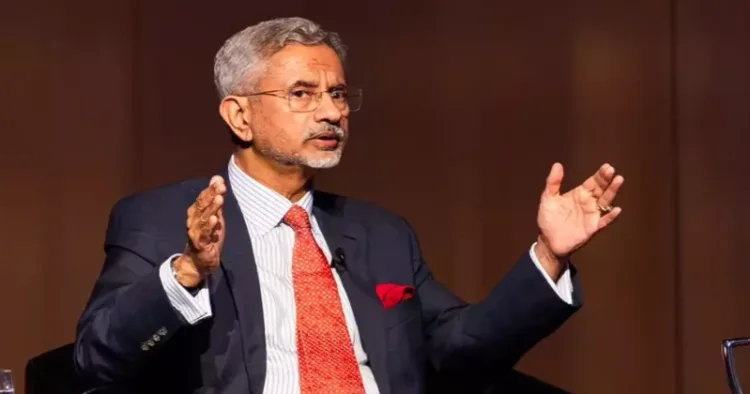External Affairs Minister S Jaishankar said that India remains “committed to engaging with China through bilateral discussions to arrive at a fair, reasonable and mutually acceptable framework for a boundary settlement.”
Briefing the Lok Sabha on India-China ties as well as disengagement at the Line of Actual Control (LAC), Jaishankar said that bilateral ties between the two countries have been “abnormal” since 2020 when “peace and tranquillity in the border areas were disturbed as a result of Chinese actions.”
“Recent developments that reflect our continuous diplomatic engagement since then have set our ties in the direction of some improvement,” he said. Addressing Lok Sabha, he shared with members of the expectation regarding direction of ties with China in the near future.
“Our relationship had progressed in many domains, but was obviously negatively affected by recent events. We are clear that the maintenance of peace and tranquility in border areas is a pre-requisite for the development of our ties. In the coming days, we will be discussing both de-escalation as well as effective management of our activities in the border areas,” Jaishankar said.
The External Affairs Minister said that “the conclusion of the disengagement phase now allows us to consider other aspects of our bilateral engagement in a calibrated manner, keeping our national security interests first and foremost.”
He said that in his recent meeting with Chinese Foreign minister Wang Yi, an understanding was reached that the Special Representatives and the Foreign Secretary level mechanisms will be convening soon.
Jaishankar said, “The immediate priority was to ensure disengagement from friction points so that there would be no further untoward incidents or clashes. This has been fully achieved. The next priority will be to consider de-escalation, that would address the massing of troops along the LAC with associated accompaniments.”
The union minister also recalled the 2020 face-offs between Indian and Chinese forces along the Line of Actual Control (LAC) in eastern Ladakh and affirmed, “Members would recall that the amassing of a large number of troops by China along the LAC in eastern Ladakh in April-May 2020 resulted in face-offs with our forces at a number of points. The situation also led to the disruption of patrolling activities. It is to the credit of our armed forces that despite logistical challenges and the then prevailing Covid situation, they were able to counter-deploy rapidly and effectively.”
He noted that “The House is well aware of the circumstances leading up to the violent clashes in Galwan Valley in June 2020. In the months thereafter, we were addressing a situation that had not only seen fatalities for the first time in 45 years, but also a turn of events serious enough for heavy weaponry to be deployed in close proximity to the LAC. While a determined counter deployment of adequate capability was the Government’s immediate response, there was also the imperative of a diplomatic effort to defuse these heightened tensions and restore peace and tranquility.”
The contemporary phase of ties with China dates back to 1988, said Jaishankar, when there was a clear understanding that the Sino-Indian boundary question will be settled through peaceful and friendly consultations. “In 1991, the two sides agreed to maintain peace and tranquility in the areas along the LAC pending a final settlement of the boundary question. Thereafter, in 1993, an Agreement was reached on the maintenance of peace and tranquility. Subsequently in 1996, India and China agreed on confidence building measures in the military field,” he said.
“In 2003, we finalised a Declaration on Principles for our Relations and Comprehensive Cooperation, which included the appointment of Special Representatives. In 2005, a protocol was formulated on Modalities for the Implementation of Confidence Building Measures along the LAC. At the same time, the Political Parameters and Guiding Principles for the settlement of the boundary question was agreed to,” the minister said.
“In 2012, a Working Mechanism for Consultation and Coordination (WMCC) was established. And a year later in 2013, we reached an understanding on border defense cooperation as well. The purpose of my recalling these agreements is to underline the elaborate nature of our shared efforts to ensure peace and tranquility. And to emphasize the seriousness of what its unprecedented disruption in 2020 implied for our overall relationship.”
Jaishankar said that India was and will remain very clear that the three key principles must be observed in all circumstances. The first he said is that both sides should strictly respect and observe the LAC, the second is that neither side should attempt to unilaterally alter the status quo, and third that agreements and understandings reached in the past must be fully abided by in their entirety.
#WATCH | In the Lok Sabha, EAM Dr S Jaishankar says "The situation arising after our counter deployment in 2020 called for multiple sets of responses. The immediate priority was to ensure disengagement from friction points so that there would be no further untoward incidents or… pic.twitter.com/7hpZcWvcco
— ANI (@ANI) December 3, 2024
Last month, Defence Minister Rajnath Singh met his counterpart Admiral Dong Jun in Laos, where he emphasised that India-China needs to move from disengagement to de-escalation to further build trust and confidence.
Singh also held a bilateral meeting with Defence Minister of China Admiral Dong Jun in Vientiane. The bilateral meeting was held on the sidelines of the ASEAN Defence Ministers Meeting Plus where Singh emphasised and looked forward to greater trust and confidence building between the two sides through de-escalation.
This was the first meeting of Defence Ministers following the recent disengagement agreements and the meeting of Prime Minister Shri Narendra Modi and Chinese President Xi Jinping on the sidelines of the BRICS summit.
Meanwhile, the winter session of Parliament commenced on November 25 and will conclude on December 20.Both houses only saw brief sessions in the past week following ruckus amid opposition’s demand to discuss the Adani indictment.
(with inputs from ANI)



















Comments